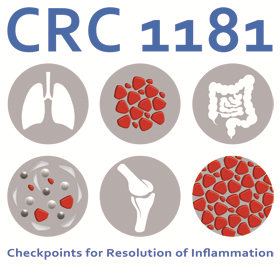Organs and Diseases
What are the similarities between diseases such as rheumatoid arthritis, inflammatory bowel diseases and asthma?
All of these diseases are related to the immune system attacking the own body and increasing inflammatory responses. So far, all chronic inflammatory diseases are incurable, only specific medication can reduce or bring the disease activity to a standstill. Finally chronic inflammatory diseases lead to lifelong suffering, manifested in extended sick leave or disability causing an enormous burden on the health system in industrialized countries.
 Inflammatory Joint Diseases
Inflammatory Joint Diseases
Inflammatory joint diseases such as rheumatoid arthritis or gout are accompanied by typical inflammatory characteristics (swelling, redness, heating, pain, functional restrictions) of affected joints. The causes are stimuli which trigger the inflammatory response in the joint e.g. uric acid crystals in gout or auto-antibodies (antibodies against the body’s own cells) in rheumatoid arthritis. Anti-inflammatory medication (e.g. cortison) are successfully employed to therapeutically treat these diseases however nowadays specific triggers of the disease can be target. Thus deploying specific drugs to fight the cause of disease not its symptoms, resulting in treatment of gout with uric acid reducing drugs and immunomodulatory therapeutic drugs in autoimmune diseases such as rheumatoid arthritis.
 Inflammatory Bowel Diseases
Inflammatory Bowel Diseases
Chronic inflammatory bowel diseases (IBD) such as Crohn’s disease and colitis ulcerosa colitis are characterized by stomachaches, which are characterized as continuously ongoing, relapsing as well as accompanied by weight loss and physical weakness. The causes are largely unknown however genetic predisposition plays an important role whereas environmental factors such as smoking could be triggers. So far both diseases are incurable. All therapeutic measurements serve to improve the quality of life of patients, to alliviate pain and suffering and to avoid complications. Thus to inhibit inflammation in both diseases immunsupressive drugs in combination with probiotics are subscribed to alleviate inflammation.
 Inflammatory Respiratory Diseases
Inflammatory Respiratory Diseases
Bronchial asthma is one of the most well-known and widespread chronic inflammatory diseases of the respiratory system which is characterized by a persistant inflammation of the bronchial mucosa. Resulting in swelling of the mucous membrane and excessive production of secretion leading to narrowing of the bronchi. An acute asthma attack causes a spasm of the bronchial muscles impairing exhalation and oxygen supply of the body. So far the triggers of inflammatoy respiratory diseases are elusive however genetic predisposition together with different environmental factors are responsible for onset of disease. Whereas forms exist which are triggered by allergic symptoms of respiratory tract such as hay fever. Primarily disease will be treated by bronchodilatatic drugs in combination with anti-inflammatory therapeutics such as cortison.
